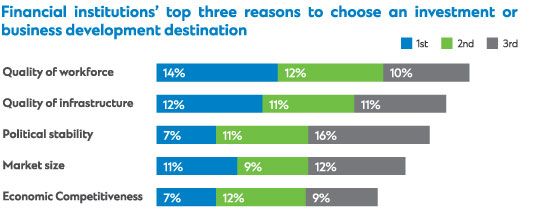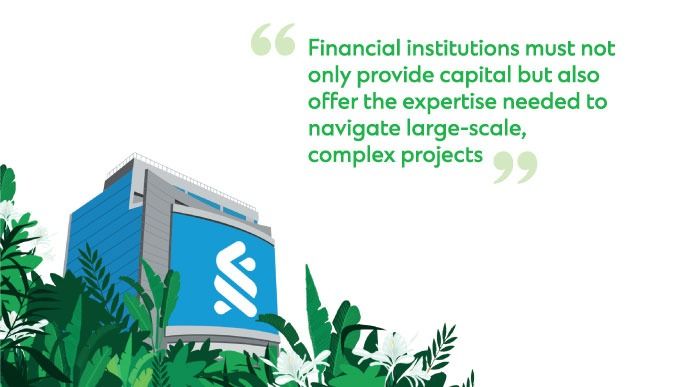- info@ficci.org.bd
- |
- +880248814801, +880248814802
- Contact Us
- |
- Become a Member
- |
- |
- |
- |
- |


Bangladesh stands at a pivotal moment. Despite inflation, supply chain disruptions, and geopolitical uncertainties, the economy remains resilient. With robust growth, an expanding industrial base, and a young, digitally adept workforce, Bangladesh is evolving from an emerging economy into a dynamic global market.
However, momentum alone won't be enough. Standard Chartered's recent report, "Future Powerhouses: How Western Financial Institutions are Banking on Dynamic Markets", highlights the need for closer cooperation between policymakers, business leaders, and financial institutions. The stakes are high, but so are the opportunities.
A Standard Chartered survey of 400 senior executives from financial institutions across Europe and the Americas-50% of whom are in the C-suite-revealed growing interest in dynamic markets. Eighteen percent ranked Bangladesh among their top ten investment destinations, affirming the country's potential. But while interest is mounting, investors still need reassurances: Can Bangladesh navigate geopolitical uncertainties, maintain policy stability, and keep pace with technological change?

This is where the financial sector must step up. Investors need more than awareness; they need guidance. Many are unfamiliar with Bangladesh's unique market dynamics. Banks like Standard Chartered, with a global footprint and deep local expertise, are well-positioned to bridge this gap-identifying opportunities, managing risks, and creating sound investment strategies.
Sectoral Opportunities: Key Drivers of Investor Interest
Key sectors such as infrastructure, manufacturing, and renewable energy continue to attract investor interest. However, optimism about these sectors is tempered by concerns over execution and sustainability. Infrastructure, in particular, presents significant growth potential, but its development hinges on sound financing structures. Financial institutions must not only provide capital but also offer the expertise needed to navigate large-scale, complex projects.
Banks will play a critical role in structuring these investments for resilience, mitigating risks while maintaining a focus on sustainable growth. Although the potential for infrastructure development is clear, it must be approached with caution to ensure viability amidst both local and global risks.
Financial institutions' top three reasons to choose an investment or business development destination

Policy and Investment: The Balancing Act
Investor confidence is closely tied to policy predictability. Bangladesh's progress can be sustained only if policies remain clear and consistent. A progressive tax regime, for instance, could be instrumental in attracting and retaining foreign investment. Research suggests that a corporate tax rate of 20% through 2031 could significantly boost tax revenues and foreign direct investment. The need for long-term policy continuity, fiscal or otherwise, is essential.
Policy reforms that modernize company formation laws, improve intellectual property rights, and trade controls, ease foreign direct investment, and spur digitalization could unlock new opportunities. Yet, these reforms must be accompanied by assurances of stability and clear communication from the government. Political stability and fiscal policy consistency are just as important as economic fundamentals in ensuring investor confidence.
Bangladesh's political stability with a sharp focus on maintaining law and order will ensure viability for fresh investments. New projects will also require uninterrupted power supply and energy security is critical to make Bangladesh a competitive investment destination.
Digital Transformation: The Next Frontier
One of Bangladesh's most exciting opportunities lies in digital transformation. As the country moves toward becoming a cashless economy, banks will play a pivotal role in driving this shift. Digitalizing trade processes and introducing supply chain finance innovations can provide the much-needed efficiency, transparency, and productivity gains that will attract investment. Digital tax collections and a fully integrated digital ecosystem are other critical elements in Bangladesh's growth story.
Our research indicates that digital supply chain finance could boost trade across key regions by 7.5% by 2030. For Bangla- desh, this opens new doors, especially for small and medium-sized enterprises (SMEs) seeking to integrate into global supply chains. However, to realize this potential, the banking sector must do more than facilitate transactions must become a technology partner, building the digital infrastructure needed for secure and seamless operations.
At the same time, digitalization introduces new risks, particularly in cybersecurity. Any digital transformation strategy must be accompanied by robust security measures to protect the integrity of financial systems and investor interests.
Showcase Bangladesh: Building Investor Trust
As Bangladesh embarks on a new chapter, managing investor expectations becomes critical. The country is well-known as a manufacturing hub, but it must expand its global narrative to include high-value sectors like bicycles, smartphones, and automobile assembly.
The recent political uncertainty adds complexity to the investment landscape. While Bangladesh's demographic advantages- a young, growing middle class-remain attractive, restoring investor confidence will require consistent communication and a reliable regulatory framework. Banks must play a leading role in shaping the narrative around Bangladesh's potential and ensuring that risks are clearly understood and managed.
Capital Markets: Building for the Future
For long-term growth, developing Bangladesh's capital markets is essential. Expanding the debt capital market and introducing instruments like sustainability-linked bonds and Islamic finance products could help diversify the investor base. However, given the relatively low investor interest in listed equity in Bangladesh-only 16% of surveyed investors consider it a priority-there is significant room for growth.
This growth, however, will not come without challenges. Political and economic uncertainties may create hesitation among investors, especially in long-term projects. Banks must tackle these concerns head-on, structuring products that are not only attractive but also resilient to the inherent risks of emerging markets like Bangladesh.
Leading with Vision
By forging strong partnerships between the public and private sectors, the banking industry can position Bangladesh as an investment destination that, despite its challenges, is rich with opportunity. We must continue to promote financial inclusion, support key industries, and drive both digital and capital market development-while maintaining a risk-aware approach to ensure sustainable growth.
The future of Bangladesh as an investment destination is promising, but reaching our full potential will require a balanced, strategic approach-one that acknowledges risks while continuing to pursue long-term growth. As we move forward, we must be clear about our goals. We stand at a crossroads: we will either make history or be unmade by it.






